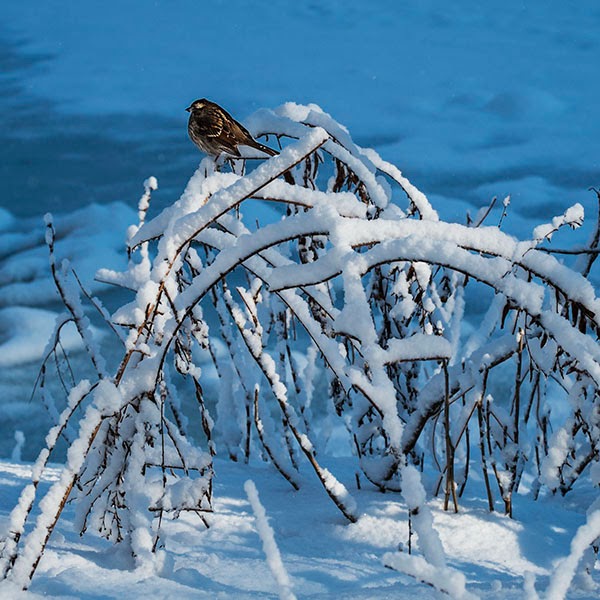When I woke up early yesterday morning I noticed from my window that the trees still had a layer of icy snow on their branches. The sun was just coming up and hitting the tree tops causing them to glisten. The temperature was supposed to rise above freezing and I knew there would only be a short envelope of good photography before the temperature would be too high causing the sun to melt the snow on the trees. So I threw a Fuji X-Pro1 along with the two zooms and 14mm wide angle lens in a bag and trudged off to Central Park.
Usually I photograph snow while it is falling with the sky cloudy, not in the bright sunlight of a day like this. The early morning light dipped into the park once the sun rose over the tall buildings of the city. When the light is early like this the shadows have a nice blue cast, but the highlights are still not too blasted out. I knew I had an hour at most of prime photography.

I have both an X-Pro1 and X-E2 cameras, and have been using primarily the X-E2 ever since it came out. Although I prefer the hybrid optical/EVF finder of the X-Pro, I have also come to appreciate that improved features of the X-E2. On this occasion I took along the X-Pro1. It wasn't long before I realized how differently the two cameras perform. The most noticeable difference was in the focus. The X-Pro was hunting and slow to focus compared to the X-E2. While there have been quite a few firmware updates to the X-Pro to bring it into line with the newer models, I began to realize these were just patch work improvements compared to the enhancements in the newer X-E2 model. I found myself getting frustrated with the slow response time and now awkward menu buttons of the X-Pro1.

The X-Pro is still my favorite camera type with its combination of optical and electronic finder. I'm looking forward to the more advanced features, particularly the weather sealing, of the new X-T1, but deep down I'm really longing for a new X-Pro2 model with the viewfinder I like and all the new features that Fuji has incorporated in each model update.
 |
| Many of the scenes lent themselves to the 16:9 crop format of the X-Pro1 |
All of these photographs were taken in very hard sunlight with deep shadows and extremely bright highlights off the white snow. I set the the X-Pro1 for auto exposure and varied the exposure compensation from 0 to +2/3, the later to compensate when the scene was predominantly white. All images were done in RAW. When I developed the RAW images with Adobe Bridge, I was amazed at the extent of their dynamic range. There was complete detail in all the highlights and shadows. Typically I would have expected the highlights to blow out with direct sunlight on white snow. The images you see here had only minor tweaking for contrast and exposure, usually in local areas where I wanted to tone the image up or down a bit.

I did use a gray card to measure the color balance in the highlights and shadows, but ended up staying with what the camera interpreted on its own with auto color balance. It was early enough in the day for the sun to add some yellow to the highlights, while all the shadow areas went a predictable blue. I was able to photograph for about an hour until the light became too harsh.
I am definitely looking forward to trying the X-T1, but I am also confident that the X-Pro model will remain my favorite. I just wish Fuji would speed up delivery of a newer X-Pro model with all the niceties of the X-E2 and X-T1.












No comments :
Post a Comment